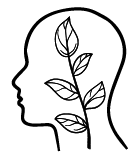“Have you read her? Rand?”
Bert Cooper, with his eyes almost bulging out their sockets, points over to his bookshelf. A thick, greenish-grey cover rests at the end in stark contrast.
“Atlas. Shrugged. That’s the one,” he says convincingly, holding his index finger up to emphasize his point. Despite not having read it, Don Draper feels compelled to agree.
This is a scene from one the earliest episodes of Mad Men. Bert Cooper, the elder co-founder of the innovative, 1960s ad agency that the show revolves around, had just given his top employee and series-protagonist Don Draper an unexpected bonus of $2,500 (worth over $20,000 in today’s money). Initially shocked, Don becomes visibly more open and vulnerable than his typical cool, reserved self. Cooper sees this opening and capitalizes, using Ayn Rand’s Atlas Shrugged as his tool to explain to Don what this money means beyond a simple exchange for services or token of appreciation.
Mad Men always resonated with me because of its effortless ability to weave a variety of complex themes and ideas into each episode. It’s no surprise, then, that the show recommends a book that does quite the same. I’m only halfway through (and I say “only” as if it isn’t 1,200 pages long), but there have so many ideas coming across through the fictional story. One theme, though, has stuck out to me among the rest. That being: the importance of developing a moral code.
It almost pains me to repeat the reality that many of us have become numb to, so to put it simply: we live in interesting times. I don’t need to dive into specifics because we all have an intrinsic understanding of this. From the realm of politics to war, to the state of the economy, to any and every social issue conceivable, we are a country, and, perhaps, a world that has never gone through times quite like these (even though I’m sure that every generation has said something similar before).
Because of this, whether we realize it or not, our morality and sense of right and wrong have now been called into question.
What is right, and what is wrong?
Does objective truth exist, or is truth purely subjective?
Is there such thing as evil? And if there is, are people who do “evil” things aware of this, or do they see themselves as righteous and well-intentioned?
How do we know that we’re the ones on the right side of history?
Is following the crowd or having “good intentions” simply enough?
These questions and more immediately come to mind, but they aren’t ones I have any desire to answer right now. Instead, these are the questions that each of us have a duty to, one day, answer for ourselves. At the very least, as thinking beings, I believe we have a duty to begin asking them.
I think back to Atlas Shrugged. Author Ayn Rand makes it painfully obvious that in the fictional America where the story takes place, morality has been flipped on its head. The generally held beliefs on truth, love, and virtue are inverted. Mainstream society is not on the side of the virtuous, man. As a result, even the story’s best of characters feel a sense of guilt whenever they attempt to break away from this widely cast spell.
Consider this: Do you remember learning about historical atrocities, like the Salem Witch Trials or Nazi Germany? It seems so self-evident that these societies had been corrupted. We practically think to ourselves, “How could so many people go along with something so blatantly wrong?”
Well, hindsight is 20/20.
Consider something more personal: Has there ever been a time in your life when something was so obviously wrong, but everybody seemed to be going along with it anyways? You felt alone, as if the world had gone mad, and you were the only one who could see the truth?
What was that feeling that made you question what everybody else seemingly did not, or could not?
That is a glimpse into what it means to have a moral code.
A conscience.
A north star, guiding you towards what is right, away from what is wrong, towards truth and clarity, away from chaos and confusion.
If we care about the truth, then developing a moral code is essential. But how do we develop one? And even if we do, how do know we that it is one worth following?
Throughout my life, whether I was religious, Atheist, conservative, liberal, or anything in between, I always had a desire for the truth. So often, though, when I thought that I was on the “right” side of things, I would later come to realize how misguided or naïve I was. The reason being: I was never afraid to ask questions and consider the possibility that maybe I wasn’t seeing the full picture.
It begs the question: in 2023, with the world as it is, how do I know that this time, I am right? How can any of us know? How do we know that we are virtuous (which is defined as “a conformity to a standard of right; a particular moral excellence”)?
Who, or what, determines what is virtuous and true?
Religions have sought to answers these questions for ages. Philosophers and great thinkers, too. Aristotle, living in the year 400 B.C., developed one of the first set of ethics and virtue that was later adapted into Catholic teachings. Today, some utilize the practice of science to develop a more “objective” morality. Others use bits and pieces from all the above to pose their own set of ideals to the public.
Regardless of the route you choose, history has made it clear that “good intentions” and whatever is deemed popular by the mainstream are not always accurate gauges. The people of Salem surely thought they were serving God’s will, for example. How can we know that we would’ve been one of the brave few who went against the madness of that crowd?
Morality relies on more than the flow of the wind. It relies on deep, permanent structures: on our souls, on love, and on truth. It relies on sets of principles and narratives that have stood the test of time, like the golden rule and the hero’s journey. Personally, I believe it relies on God.
I mentioned earlier that I had no desire to answer the questions I introduced. I know now, though, that I’m not even capable of answering them at this point in my life. But I know that we cannot afford to not at least ask them. I know, also, that we cannot afford to blindly trust anyone who refuses to ask them.
Our moral code is the guiding light that shines regardless of our surroundings may be. It’s like a lighthouse, with its beacon of light breaking the thickness of the night. It is our weapon of defense in a society that is run by propaganda, lies, and division; it is our shield against those who would rather remain fools than admit that they have been fooled;
The importance of developing this code and becoming someone of virtue cannot be underestimated.
If the majority of us understood this, perhaps we would not be where we are today.


Thanks for the article was very helpful.